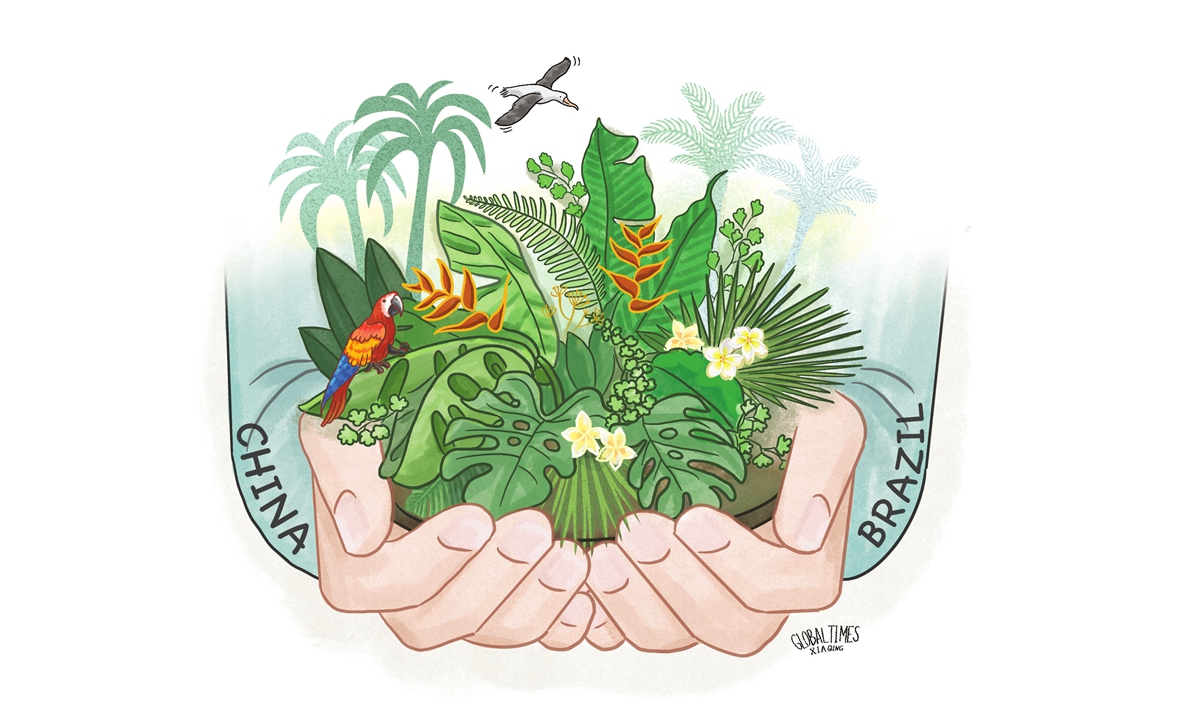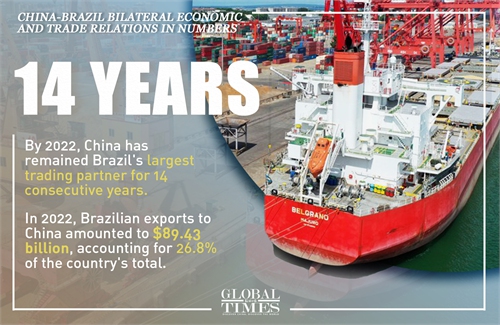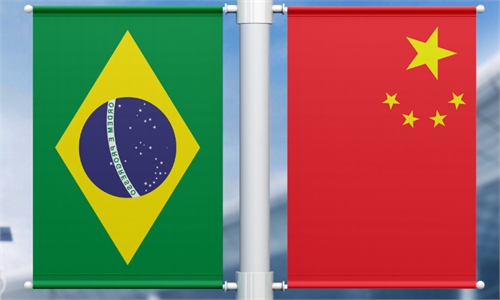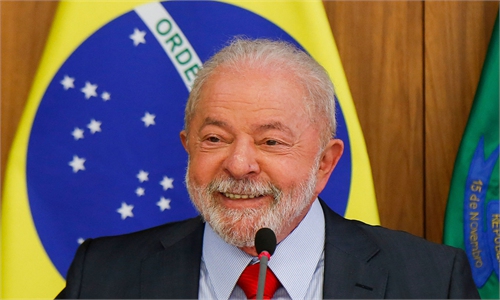Great potential for China-Brazil cooperation on Amazon conservation

Illustration: Xia Qing/GT
Brazilian President Luiz Inácio Lula da Silva is commencing his visit to China, accompanied by a number of cabinet ministers, state governors, legislators, and 240 business leaders. Looking at this delegation lineup alone, one can predict that China-Brazil relations, especially economic and trade relations, will reach a new level.It reminded me of a scene when I was working in Brazil eight years ago. I remember a gathering event of the Brazilian business community where the head of an association of the meat and poultry industry said in his speech, "Brazil exports not only beef, chicken, and pork but our water, our world-class environment."
Brazil is the world's No.1 exporter of beef and chicken and the world's fourth-largest exporter of pork. Its exports of meat and poultry products to China have been on the rise.
An important factor in the increase of Brazil's meat and poultry exports is the high quality of these products, which is related to its water, grass, and overall feeding environment. Brazil has always been known for its excellent ecological environment, not only does it have the lungs of the earth, the Amazon rainforest, but also extremely strict environmental regulations.
However, in recent years, Amazon rainforest deforestation has been increasing and has caused global concern. According to Brazilian official data released on April 7, the rate of deforestation in the Amazon rainforest in the first quarter of 2023 was one of the worst on record, with a total of 844 square kilometers of forest land destroyed.
The international media explained that this was a consequence of eliminating various environmental protection measures during the four-year rule of former president Jair Bolsonaro and that it would take time for new President Lula to improve the deforestation situation.
At the 27th UN Climate Change Conference in Sharm el-Sheikh, Egypt last November, then Brazil's president-elect Lula pledged to protect the Amazon rainforest.
The main products that China imports from Brazil, such as energy, iron ore, soybeans, meat, and poultry, are all related to the environment, so protecting the Brazilian environment, especially the Amazon rainforest, is also an integral part of China-Brazil trade and economic cooperation.
By dressing up as judges of environmental issues and blaming the destruction of the Amazon rainforest on Brazil's exports of soybeans and meat products to China, some Western media are intentionally obscuring the West's responsibility for the rainforest destruction.
Chinese author Liu Yang writes in his book, China Has No Role Model, that the Brazilian Amazon rainforest has disappeared faster in the past nearly 40 years, than it did through 450 years of colonization. Who is enjoying all these resources? Of the trees cut down in Brazil, 50 percent of the timber goes to the US and 28 percent to Europe; 50 percent of the soybeans grown after the trees are cut down go to Europe; and some land is used to raise cattle, and 53 percent of the beef goes to Europe. In other words, the biggest beneficiaries of the disappearance of the Amazon rainforest are the Western countries, and because of their consumption, the Amazon rainforest is disappearing rapidly.
The Brazilian beef industry is controlled by a handful of meat processing companies, according to data collected by Flavia Milhorance, a leading Brazilian environmental author. In 2019, the European Union purchased $3 billion worth of beef from three major companies. And these three companies have the greatest risk associated with carbon dioxide emissions from deforestation. These three companies also export the largest share of meat products to China.
There are three main issues facing the conservation of the Amazon rainforest. One is that Western countries must take their share of the responsibility. Second, Brazilian meat producers need to improve their production methods. Third, the Brazilian government needs to strengthen its management. But management needs to both protect the growth of the industry and reduce the destruction of the rainforest, and it is in this area that cooperation between China and Brazil has potential.
In recent years, Chinese meat importers have begun to take this issue seriously and have made growing commitments, while Chinese companies investing in Brazil have also gained increasing experience in environmental protection. They strictly comply with Brazilian regulations and take their social responsibility to protect the ecological environment in Brazil.
Many of the Belt and Road projects promoted by China also have lived up to environmental standards, and environmental technologies and investments are increasing, setting up many specific implementation requirements and norms.
China and Brazil share many common pursuits on climate issues. We look forward to President Lula's visit to further promote China-Brazil cooperation on environmental protection. We hope both sides can jointly design and invest in projects to protect and restore the Amazon rainforest.
The author is a senior editor with People's Daily, and currently a senior fellow with the Chongyang Institute for Financial Studies at Renmin University of China. dinggang@globaltimes.com.cn. Follow him on Twitter @dinggangchina




